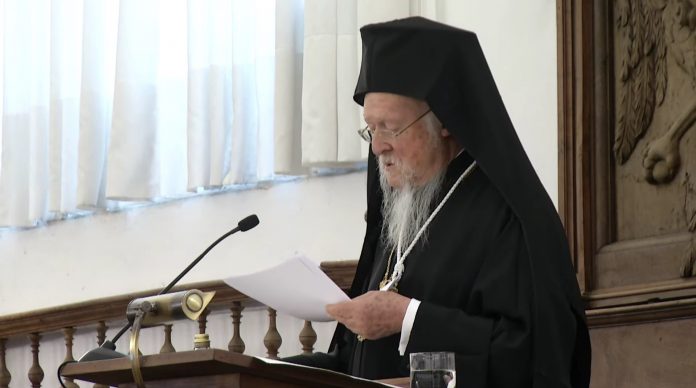Σήμερα, Τρίτη 17 Οκτωβρίου 2023, ο Οικουμενικός Πατριάρχης Βαρθολομαίος, στο πλαίσιο της επίσημης επίσκεψής του στην Ισπανία, ανακηρύχθηκε Επίτιμος Διδάκτωρ του Ποντιφικού Πανεπιστημίου της Σαλαμάνκα.
Μετά την απονομή της τιμής, ο Πατριάρχης εκφώνησε βαρυσήμαντη ομιλία, η οποία προκάλεσε το παρατεταμένο και ενθουσιώδες χειροκρότημα των παρευρισκομένων.
Ο Πατριάρχης, μεταξύ άλλων, αναφέρθηκε στις ειρηνιστικές προσπάθειες τόσο του Οικουμενικού Θρόνου, όσο και της Ρωμαιοκαθολικής Εκκλησίας, εστιάζοντας στην “αδικαιολόγητη και απρόκλητη” εισβολή της Ρωσίας στην Ουκρανία, αλλά και στον πόλεμο στη Μέση Ανατολή. Είπε χαρακτηριστικά:
«Σε έναν κόσμο που διχάζεται από αντιθέσεις και συγκρούσεις, η ανταλλαγή ειρηνικού και εποικοδομητικού διαλόγου είναι ο μόνος τρόπος για να επιτευχθεί συμφιλίωση και ενότητα (…). Γιατί η αλήθεια δεν φοβάται τον διάλογο. Αντίθετα, η αλήθεια πάντα προσκαλεί και επιδιώκει τον διάλογο (…). Όλοι έχουμε δει τις τραγικές συνέπειες ενός κόσμου που απορρίπτει το διάλογο και ενισχύει τη διαίρεση. Τους τελευταίους μήνες είδαμε την καταστροφή της ανθρώπινης ζωής και την καταστροφή του φυσικού περιβάλλοντος στην αδικαιολόγητη και απρόκλητη εισβολή της Ρωσίας στο κυρίαρχο έδαφος της Ουκρανίας. Και τώρα, μπροστά στα μάτια μας, βλέπουμε την καταστροφική απώλεια αμέτρητων αθώων ζωών, μαζί με την καταστροφική απώλεια δομών και υποδομών στη Μέση Ανατολή, όπου έχει ξεσπάσει και πάλι σύγκρουση, γιατί ως άνθρωποι δεν είμαστε διατεθειμένοι να συνεργαστούμε και συμβιβαστούμε για το καλό των αδελφών και των αδελφών μας, καθώς και για την προστασία της ιερής δημιουργίας του Θεού. Στο παρελθόν, μαζί με τον αγαπητό μας αδελφό, Πάπα Φραγκίσκο, προσπαθήσαμε να συναντηθούμε και να συζητήσουμε με τους ηγέτες του Ισραήλ και της Παλαιστίνης. Και μόλις πριν από λίγες μέρες εκδώσαμε μια ισχυρή δήλωση ενάντια στη χρήση βίας που υποτίθεται ότι έχει σκοπό την εδραίωση της ειρήνης».
Παραθέτουμε το βίντεο της σχετικής τελετής.
ΟΙΚΟΥΜΕΝΙΚΟΝ ΠΑΤΡΙΑΡΧΕΙΟΝ
Η Α.Θ. Παναγιότης ο Οικουμενικός Πατριάρχης Βαρθολομαίος, την Τρίτη, 17 Οκτωβρίου, το πρωί, αναγορεύτηκε Επίτιμος Διδάκτορας Θεολογίας του Ποντιφικού Πανεπιστημίου της Salamanca, σε ειδική τελετή που πραγματοποιήθηκε στη Μεγάλη Αίθουσα του ιστορικού ΡΚ εκπαιδευτικού ιδρύματος.
Παρέστησαν Ιεράρχες, ο Αποστολικός Νούντσιος στην Ισπανία, οι Πρέσβεις της Ελλάδος στην Ισπανία και την Πορτογαλία, διπλωμάτες, αξιωματικοί των ισπανικών ενόπλων δυνάμεων, Πανεπιστημιακοί Καθηγητές, και πλήθος άλλων προσωπικοτήτων, καθώς και φοιτητές.
Ο Επίσκοπος Ciudad Rodrigo και Salamanca, Σεβ. José Luis Retana, προήδρευσε της Τελετής, παρουσία του Πρύτανη Οσιολ. Santiago García-Jalón, του Ακαδημαϊκού Συμβουλίου, των καθηγητών και του διδακτικού προσωπικού, ενώ για την προσωπικότητα, το έργο και τη διακονία του Πατριάρχου μίλησε ο Καθηγητής της Θεολογικής Σχολής Οσιολ. Fernando Rodriguez Garrapucho. Το Ψήφισμα της Συγκλήτου ανέγνωσε ο Πρύτανης, ο οποίος και επέδωσε τον σχετικό πάπυρο και τα διάσημα στον Παναγιώτατο.
Στην ομιλία του, ο Παναγιώτατος, αναφέρθηκε, μεταξύ άλλων, στην αποστολή και τη διακονική προσφορά του Οικουμενικού Πατριαρχείου στην Ορθοδοξία, αλλά και στις πρωτοβουλίες του για την προώθηση του διαχριστιανικού και του διαθρησκειακού διαλόγου, με στόχο να συμβάλει και στην επικράτηση της ειρήνης στην κόσμο.
Συγκεκριμένα, ο Οικουμενικός Πατριάρχης, μιλώντας στην αγγλική γλώσσα, σημείωσε, μεταξύ άλλων, τα εξής:
“Όλοι μας έχουμε δει τις τραγικές συνέπειες ενός κόσμου που απορρίπτει τον διάλογο και ενισχύει τη διαίρεση. Πράγματι, έχουμε δει τις καταστροφικές επιπτώσεις της αντιπάθειας και του ανταγωνισμού στις ανθρώπινες ζωές, καθώς και στους πόρους του πλανήτη. Ήταν στον απόηχο των δύο παγκοσμίων πολέμων που η οικουμενική κίνηση απέκτησε δυναμική πριν από ένα αιώνα. Οι άνθρωποι απελπισμένα επιζητούσαν να ανακαλύψουν νέους τρόπους θετικής και εποικοδομητικής σχέσης μεταξύ τους, προκειμένου να υπερβούν τη βία και την εχθρότητα, καθώς και τον εθνικισμό και τον σεχταρισμό που μάστιζε τις εκκλησίες και τις θρησκείες για αιώνες.
Τους τελευταίους μήνες, γίναμε μάρτυρες της απωλείας της ανθρώπινης ζωής και της καταστροφής του φυσικού περιβάλλοντος, εξαιτίας της αδικαιολόγητης και απρόκλητης εισβολής της Ρωσίας στο κυρίαρχο έδαφος της Ουκρανίας. Ήταν, για εμένα προσωπικά αλλά και για όλο τον κόσμο, οδυνηρό, τραγικό και απεχθές, να βλέπεις τη Ρωσική Ομοσπονδία —με την αναιδή υποστήριξη και επιδοκιμασία της Ρωσικής Εκκλησίας— να εξοντώνει ανθρώπινες ζωές και να εξαλείφει φυσικούς πόρους, που θα χαθούν για πάντα από τον κόσμο μας και τα παιδιά μας. Και τώρα, μπροστά στα μάτια μας, είναι ορατή η καταστροφή από την απώλεια αμέτρητων αθώων ζωών και υποδομών στη Μέση Ανατολή, όπου μια αέναη σύγκρουση έχει αναζωπυρωθεί, γιατί ως άνθρωποι δεν είμαστε πρόθυμοι να συνεργαστούμε και να κάνουμε παραχωρήσεις για χάρη των αδελφών μας, καθώς και για την προστασία της Δημιουργίας, αυτού του ιερού δώρου του Θεού. Στο παρελθόν, μαζί με τον αγαπητό μας αδελφό Πάπα Φραγκίσκο, προσπαθήσαμε να φέρουμε κοντά και σε διάλογο τους ηγέτες τόσο του Ισραήλ όσο και της Παλαιστίνης. Και μόλις πριν λίγες ημέρες, εκδώσαμε μια αυστηρή δήλωση κατά της χρήσης βίας με το πρόσχημα της εδραίωσης της ειρήνης.”
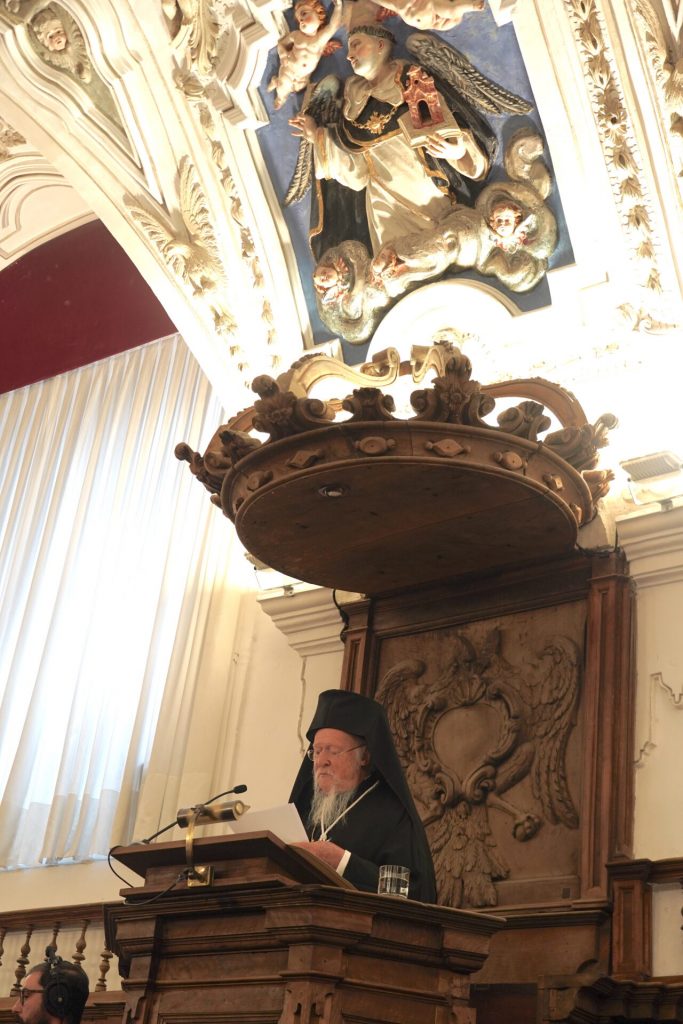
ADDRESS by His All-Holiness Ecumenical Patriarch Bartholomew on the Occasion of the Honorary Doctorate Bestowed by the Pontifical University of Salamanca (October 17, 2023)
Distinguished administration and faculty,
Dear students and guests,
It is with a sense of deep honor and sincere gratitude that we stand before you in this historic and eminent academic institution in order to receive the award of an honorary doctorate for our inter-Christian ministry and contribution to ecumenical dialogue.
While we are of course humbled by this moving recognition of our modest service to advance connections and conversations among Christian churches and interfaith communities, we would nevertheless like to draw your attention not so much to our own particular interests and personal accomplishments, but rather to the essential vision and exceptional mission of the Church of Constantinople, which we have been blessed to serve for more than thirty years as its spiritual pastor. This is because, for over seventeen centuries, our Church has selflessly facilitated the cause of canonical unity among the family of Orthodox sister Patriarchates and autocephalous Churches. Moreover, over the last century, our Church has prophetically promoted the cause of ecumenical unity among estranged Christian confessions and other religious communities both through the vibrant ecumenical movement from the early to the mid-twentieth century but also through the vital interfaith dialogue during the latter part of the twentieth century.
During this period, the Ecumenical Patriarchate assumed a prominent initiative and leadership role in creating and shaping, as well as contributing to and sustaining various fellowships including the World Council of Churches and the Conference of European Churches. At the same time, the Ecumenical Patriarchate also instituted and maintained a number of crucial, albeit challenging bilateral dialogues with the Roman Catholic Church, as well as the Anglican and Reformed Communions, for the sake of promoting the unity that we jmutually seek. However, beyond these efforts, the Ecumenical Patriarchate established broader ecumenical encounters and discussions with our Jewish and Muslim brothers and sisters for the sake of promoting greater understanding and mutual tolerance. All of these endeavors continue to be near and dear to our heart and our ministry.
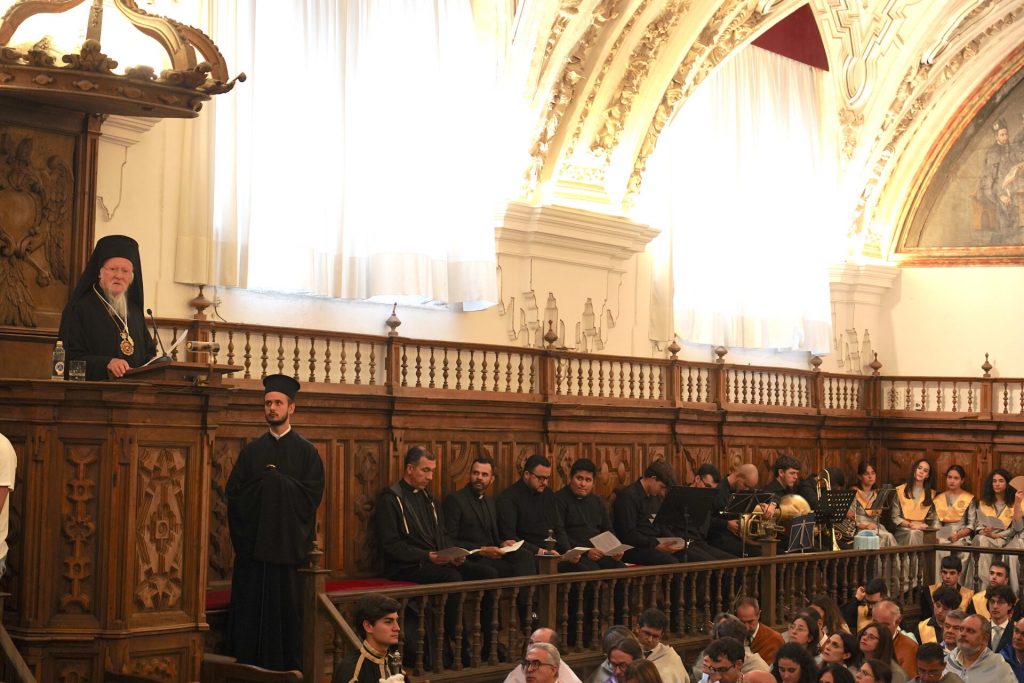
Dear friends,
What the world realized during that critical period of the last century was that it is a scandal for the followers of Christ not to follow the mandate of our Lord “that [his disciples] may be one” (John 17.21), but also that it was impossible for peace to prevail in the world if religions did not follow the shared precept of the “golden rule” that we should “do unto others as we would have others do unto us” ( Luke 6.31).
In this regard, then, we welcome the gracious honor of this honorary doctorate on behalf of the institution of the Ecumenical Patriarchate. Because ecumenical service is nothing less than the very DNA of the Ecumenical Patriarchate. Despite persistent and misguided criticism, the Church of Constantinople has never perceived its ministry or mission as a worldly form or secular model of expansionism. Instead, it understands its purpose and aspiration as the universal acceptance and advancement of human dignity and social justice in every person created in God’s image and every corner of God’s world. Our ecumenical vision is purely spiritual, based entirely on the foundational words of St. Paul, that “there is neither Jew nor Greek, neither slave nor free, neither male nor female; for all of you are one in Christ Jesus. (Galatians 3.28) These few, simple words radically overturned all kind of division and discrimination that previously or subsequently appeared on this planet.
Such, we believe, has been the genuine basis and focus of Christian ecumenical service through the centuries. We realize of course that there have been times and places when Christians did not practice what they claimed or believed. However, those examples were deviations from the right path; and they constituted a failure on the part of those who behaved with an exclusivist or isolationist attitude, rather than in an ecumenical and inclusive manner. Indeed, we would suggest to you that, what is more tragic than this failure or hypocrisy, is when Christians seek to justify or legitimize practices of discrimination and division, when people become comfortable with how they live—separated and broken by religious and racial barriers. To quote the Psalms: “I look for excuses for the sins that I commit.” (Ps. 143) We should constantly ask ourselves: How can we Christians ever stand with genuine integrity and good intention to proclaim the opening words of the Lord’s Prayer: “Our Father” when we excuse our indifference, segregation, rejection of others?
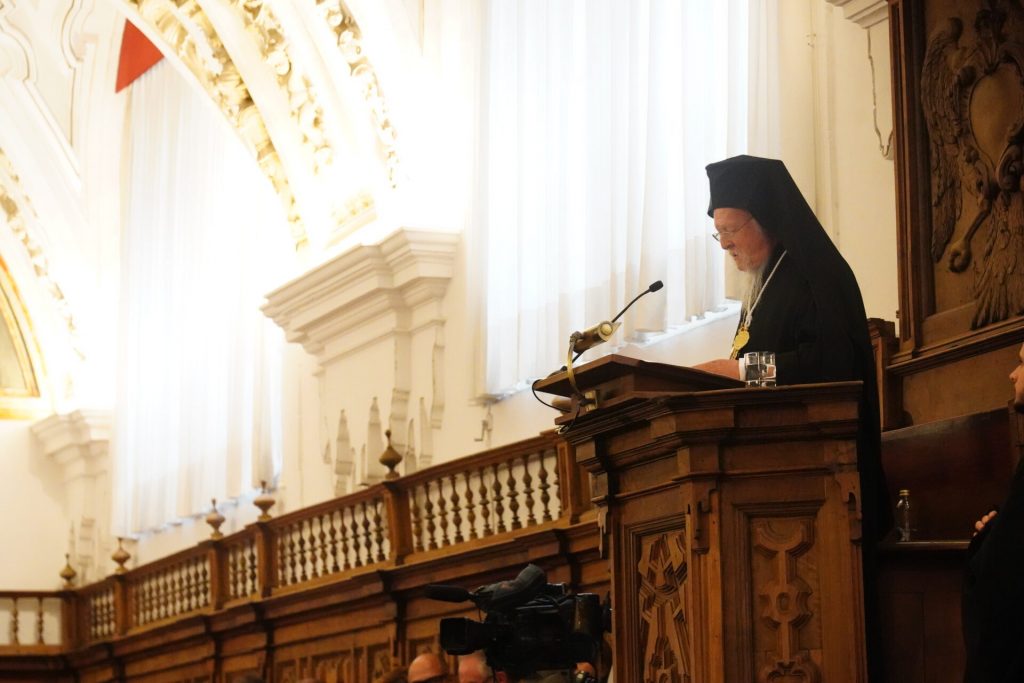
In a world shattered by contrasts and conflicts, the exchange of peaceful and constructive dialogue constitutes the only way of achieving reconciliation and unity. And in response to those who are resistant to or fearful of dialogue, we would say that the doctrinal reconciliation of existing differences among inter-Christian relations—much like the peaceful resolution of cultural differences among interfaith communities—does not imply infidelity or estrangement from truth.
Because truth does not fear dialogue; on the contrary, truth always invites and pursues dialogue. By contrast, conservatism and fanaticism provoke the defensive persistence of each side in its own positions and opinions, thereby consolidating differences and obliterating any hope of compromise or conciliation. Our objective should always be to pursue and promote “whatever is true, whatever is noble, whatever is right, whatever is pure, whatever is beautiful, whatever is praiseworthy” in other people. (Philippians 4.8). And our emphasis should always be to “speak the truth in love” (Ephesians 4.15).
All of us have seen the tragic consequences of a world that rejects dialogue and reinforces division. Indeed, we have seen the catastrophic repercussions of antipathy and antagonism on human lives as well as on the planet’s resources. It was in the wake of the two world wars that the ecumenical movement gained momentum one century ago. People were desperate to discover new ways of relating positively and constructively with one another in order to transcend the violence and hostility, as well as nationalism and sectarianism that plagued churches and religions for centuries.
In recent months, we have observed the destruction of human life and devastation of the natural environment in the unjustified and unprovoked invasion by Russia on the sovereign territory of Ukraine. It has been personally and globally painful, both tragic and reprehensible, to witness the Russian Federation—with the shameless support and endorsement of the Russian Church—eliminating human lives and obliterating natural resources that will be lost forever to our world and to our children. And now, before our very eyes, see the devastating loss of countless innocent lives, along with the destructive loss of structures and infrastructures in the Middle East, where a perpetual conflict has flared up again, because as human beings we are unwilling to collaborate and concede for the sake of our brothers and sisters as well as for the protection of God’s sacred gift creation. In the past, together with our dear brother Pope Francis, we endeavored to bring together and bring to dialogue the leaders of both Israel and Palestine. And only days ago, we issued a strong statement against the use of violence allegedly to establish peace.
Beloved sisters and brothers,
It is this spirit of sincere and loving dialogue that the Church of Constantinople has implemented in its relations among divided Christians, while at the same time proclaiming it to all believers and persons of good will, wherever they happen to be. We know from bitter experience that religion can easily be misused as a banner of fanaticism and conflict. Yet, we are also convinced that the “peace that surpasses all understanding” (Philippians 4.7), as well as the “love that bears all things, believes all things, hopes all things, and endures all things” (1 Corinthians 13.7) will ultimately prevail if our faith in God fills us with faith also in one another.
This is the peace and love that we pray will be showered upon all of you. Thank you.
La Universidad Pontificia de Salamanca (UPSA) ha nombrado esta mañana doctor honoris causa en Teología a su Santidad el patriarca ecuménico de la Iglesia ortodoxa y arzobispo de Constantinopla Bartolomé I. La ceremonia de investidura, presidida por el Gran Canciller y obispo de Ciudad Rodrigo y de Salamanca, Mons. José Luis Retana, ha estado marcada por el compromiso del diálogo ecuménico de las iglesias cristianas y ha contado con la intervención del Rector de la Universidad, Santiago García-Jalón, y la lectura de la ‘Laudatio’ por parte del padrino y profesor Fernando Rodríguez Garrapucho.
El acto ha comenzado con la intervención de la secretaria general, Mirian Cortés Diéguez, que ha leído el acta de concesión para, una vez abierto el claustro, dar comienzo a la sesión con la presencia del Doctorando.
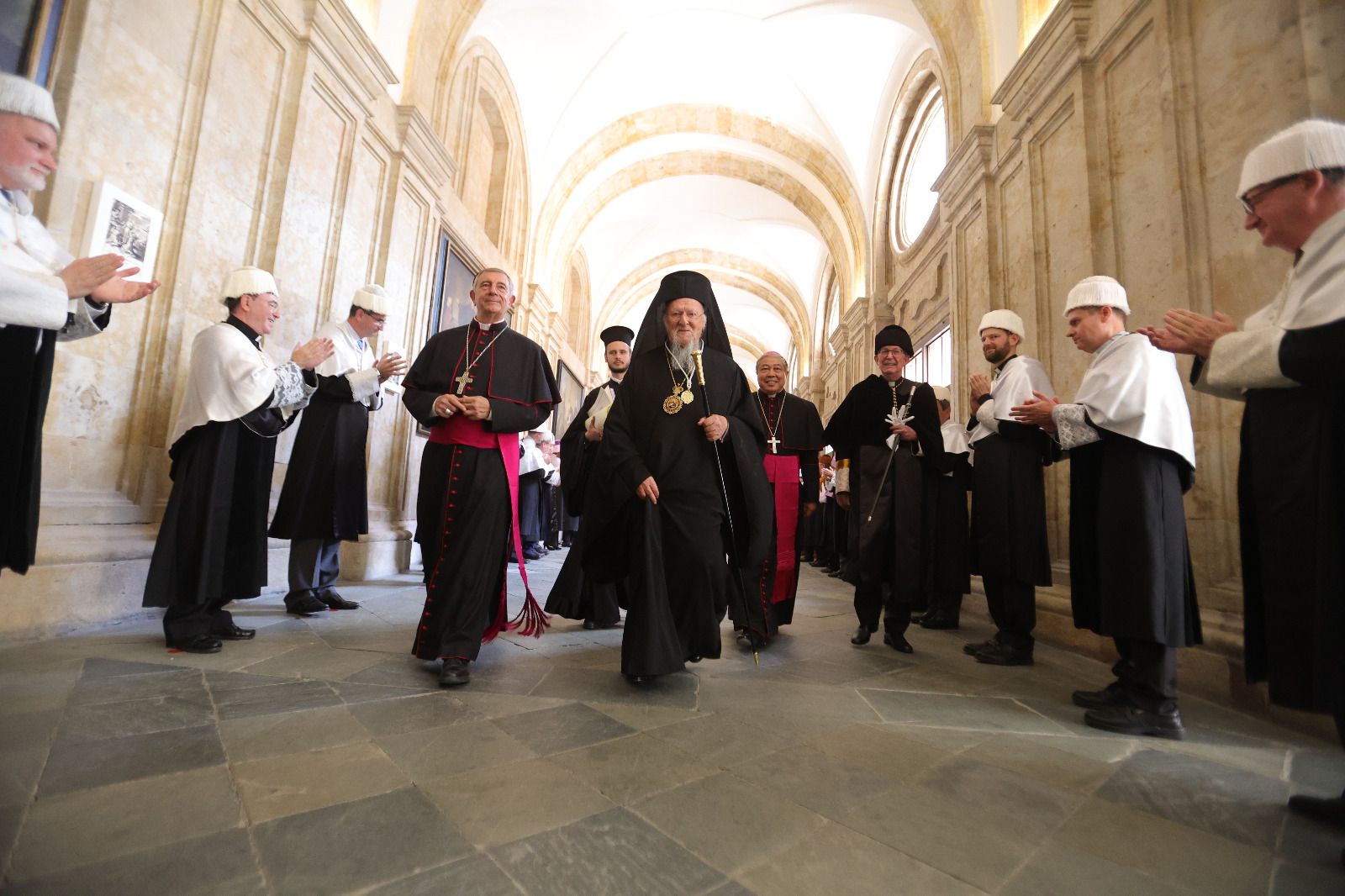
Laudatio
El catedrático Fernando Rodríguez Garrapucho, padrino del Doctorando, ha sido el encargado de pronunciar la Laudatio. Su discurso se ha centrado en cinco puntos de su trayectoria que justifican este reconocimiento. En primer lugar, la gestión dialogal de su misión, “por su espléndida actividad en la cooperación interortodoxa, intercristiana e interreligiosa, así como por las visitas formales a líderes católicos, veterocatólicos, ortodoxos y musulmanes. Sus esfuerzos promoviendo la libertad de culto y los derechos humanos, así como sus iniciativas a favor de la tolerancia religiosa en el mundo son universalmente reconocidos”.
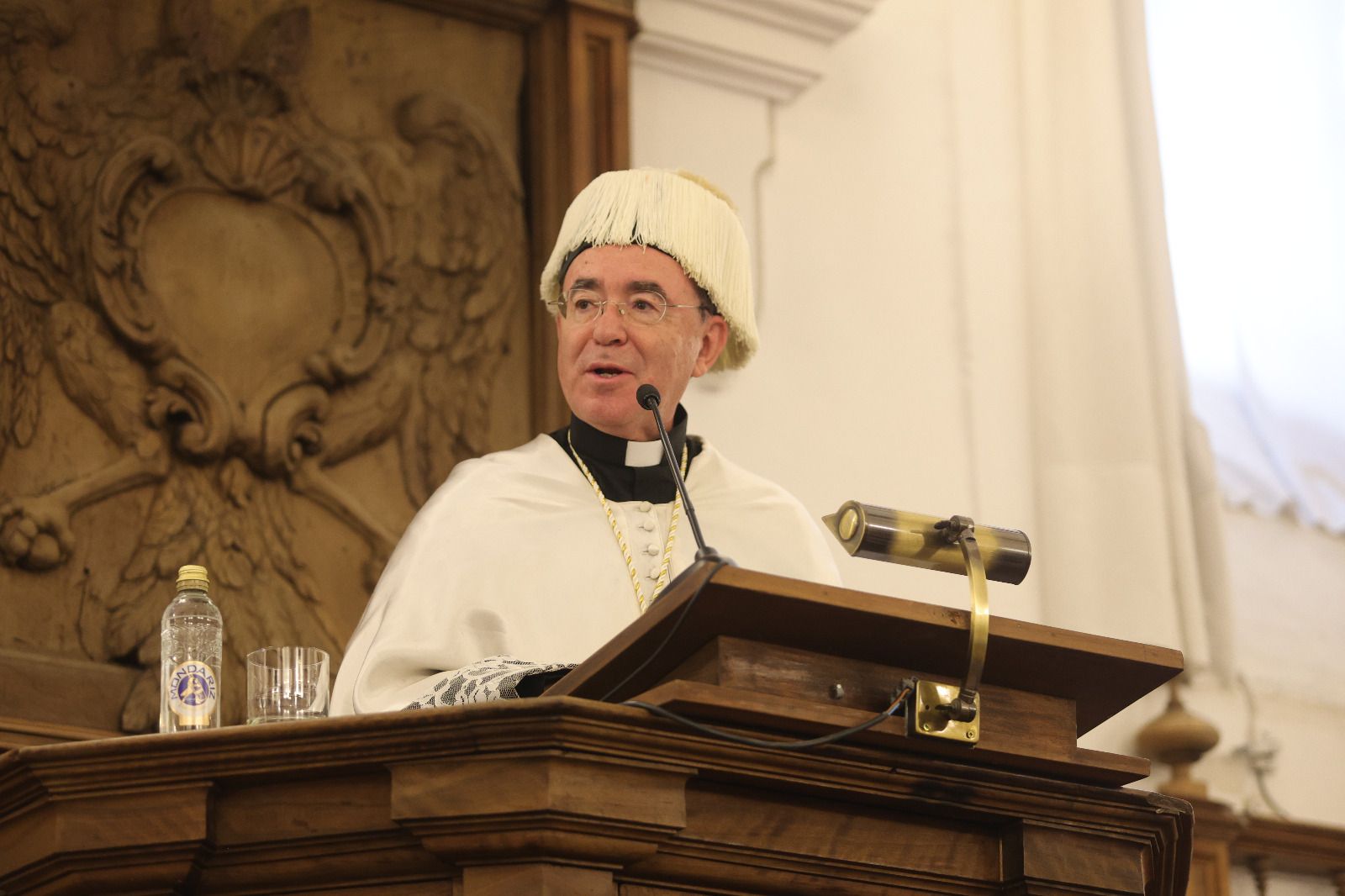
En segundo lugar, por la reconstrucción de las Iglesias ortodoxas, ya que “fue el principal desafío afrontado por su Santidad tras la caída de la Unión Soviética. En vez de construir muros, había que tender puentes (…) y en 2019 presidió la creación de la autocefalia de la Iglesia de Ucrania, lo que le ha acarreado grandes sufrimientos y el rechazo del patriarcado de Moscú. Su papel como líder espiritual del cristianismo ortodoxo no ha hecho más que crecer durante su pontificado”.
En tercer lugar, por el Concilio Panortodoxo en 2016 porque ha significado “una gran apología del diálogo dentro de la Ortodoxia, y con otras Iglesias cristianas, y un laudable exhorto a la comunidad internacional en pro de ‘una resolución de los conflictos armados’ en Oriente Medio”.
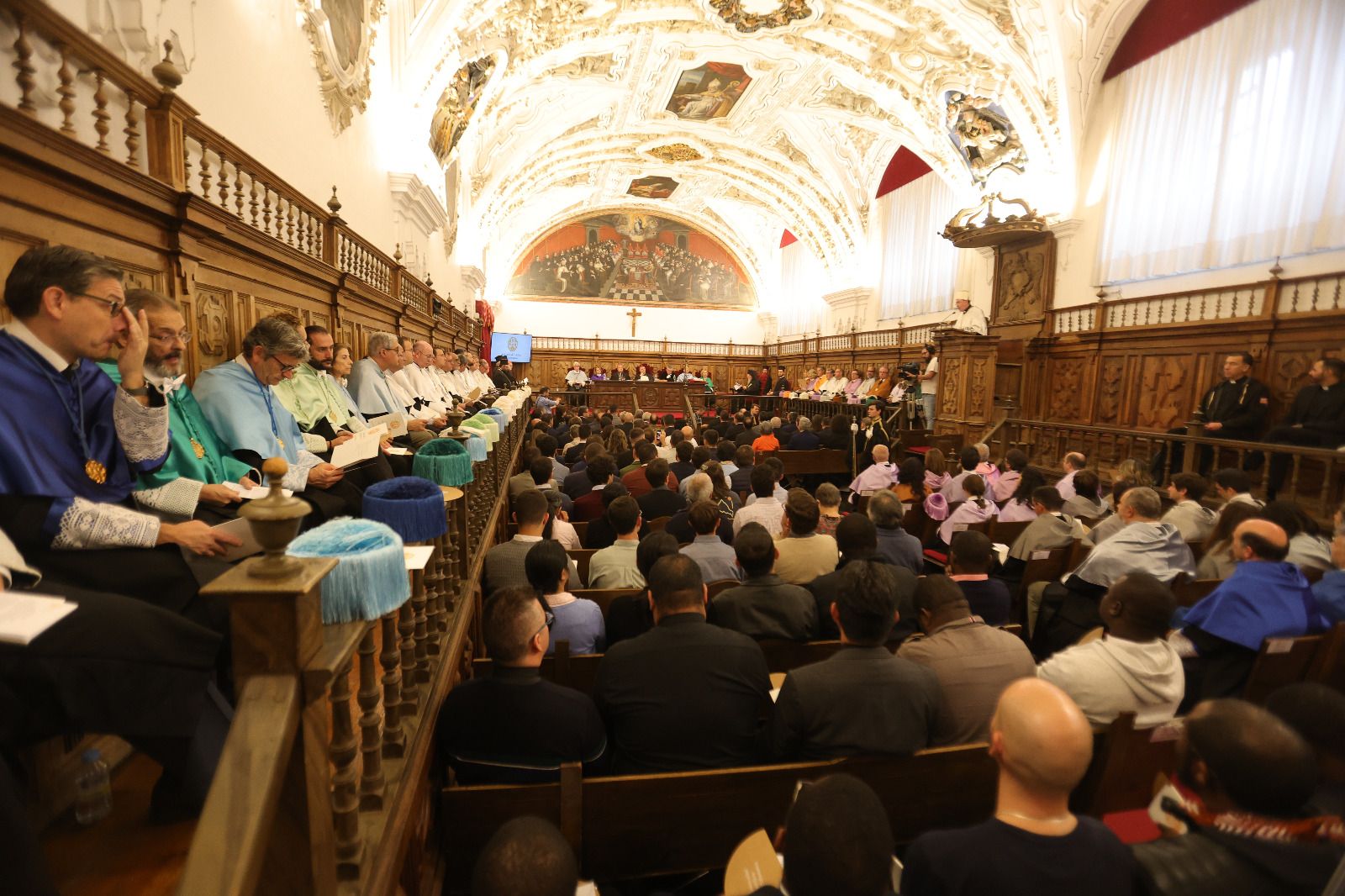
El cuarto motivo se ha centrado en la Ecología por ser conocido como “el patriarca verde al ser un líder religioso preocupado por los problemas medioambientales. Entiende que debemos aprender a sensibilizar más nuestras comunidades cristianas, hacer que nuestro comportamiento con la naturaleza sea más respetuoso, y adquirir, en fin, un corazón compasivo”. Y, por último, por la cercanía ecuménica con la Iglesia católica debido a que “su Santidad ha sido cordial y sin fisuras con los tres papas de Roma de su patriarcado: San Juan Pablo II, con Benedicto XVI y con Francisco”.
Finalmente, Rodríguez Garrapucho ha señalado que “la virtud que mejor define a nuestro ilustre Doctorando honoris causa es la paciencia. A su paciencia une su inteligencia y claros principios, cristianos y sociales de repercusión mundial”.
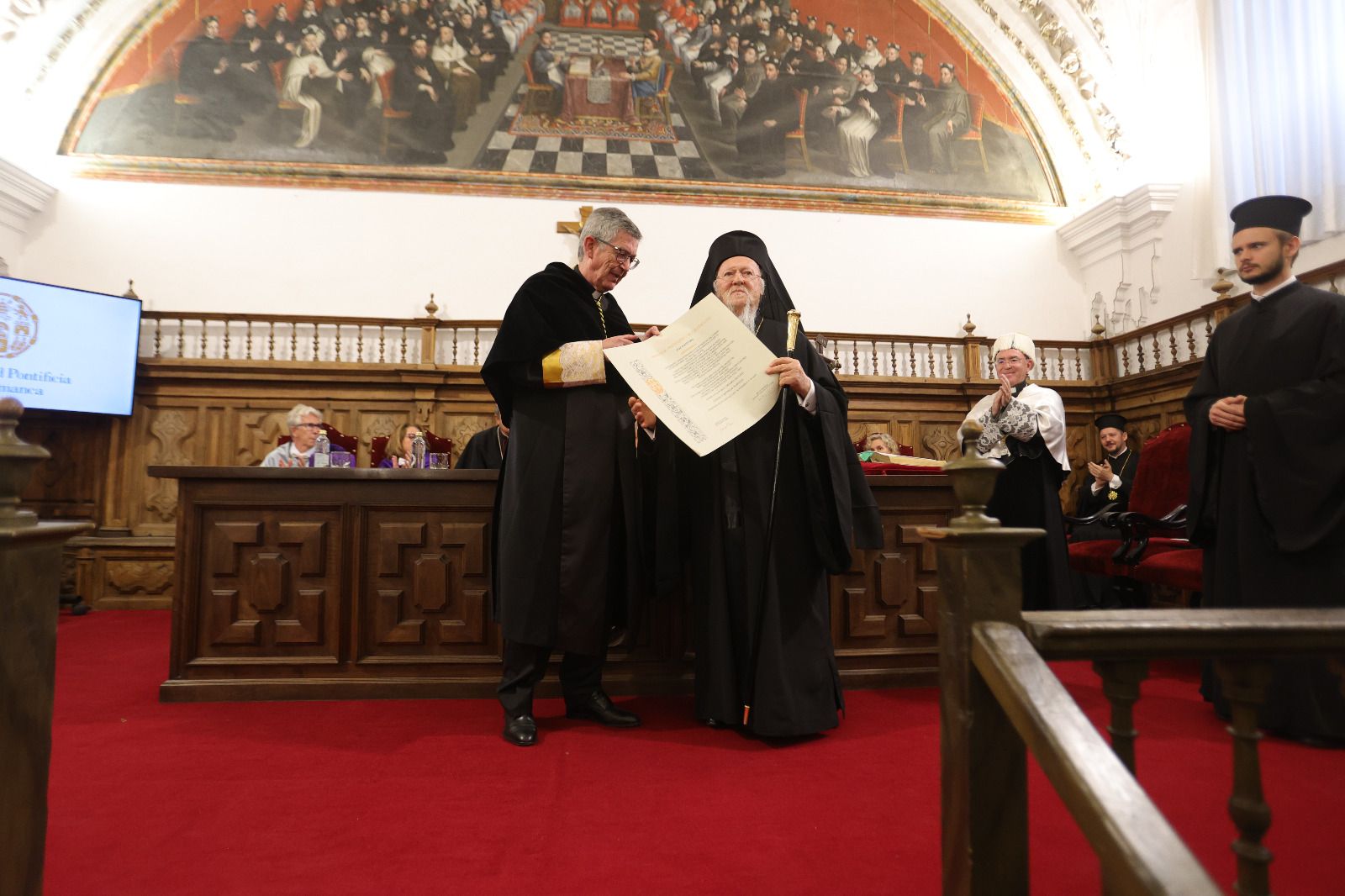
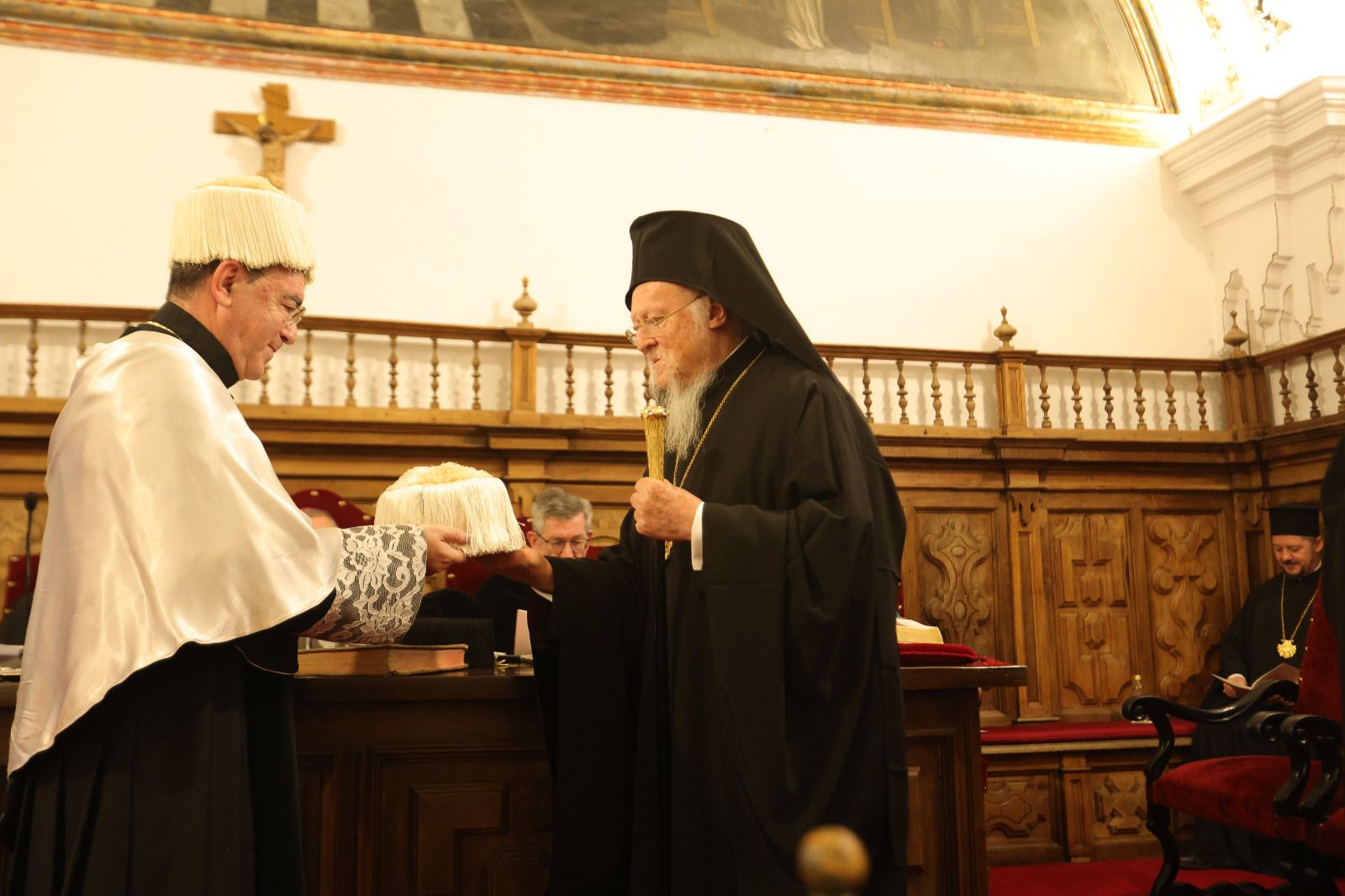
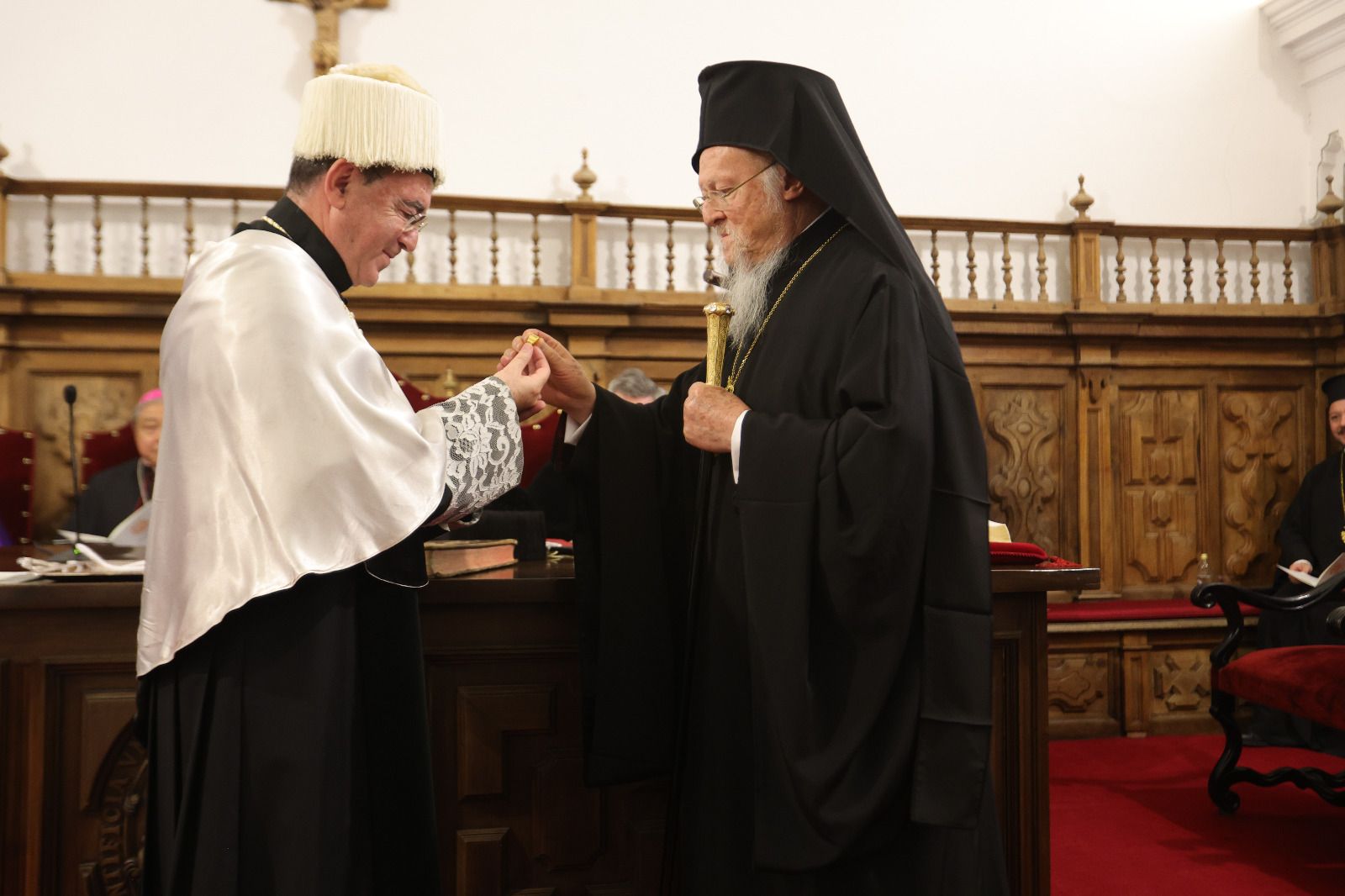
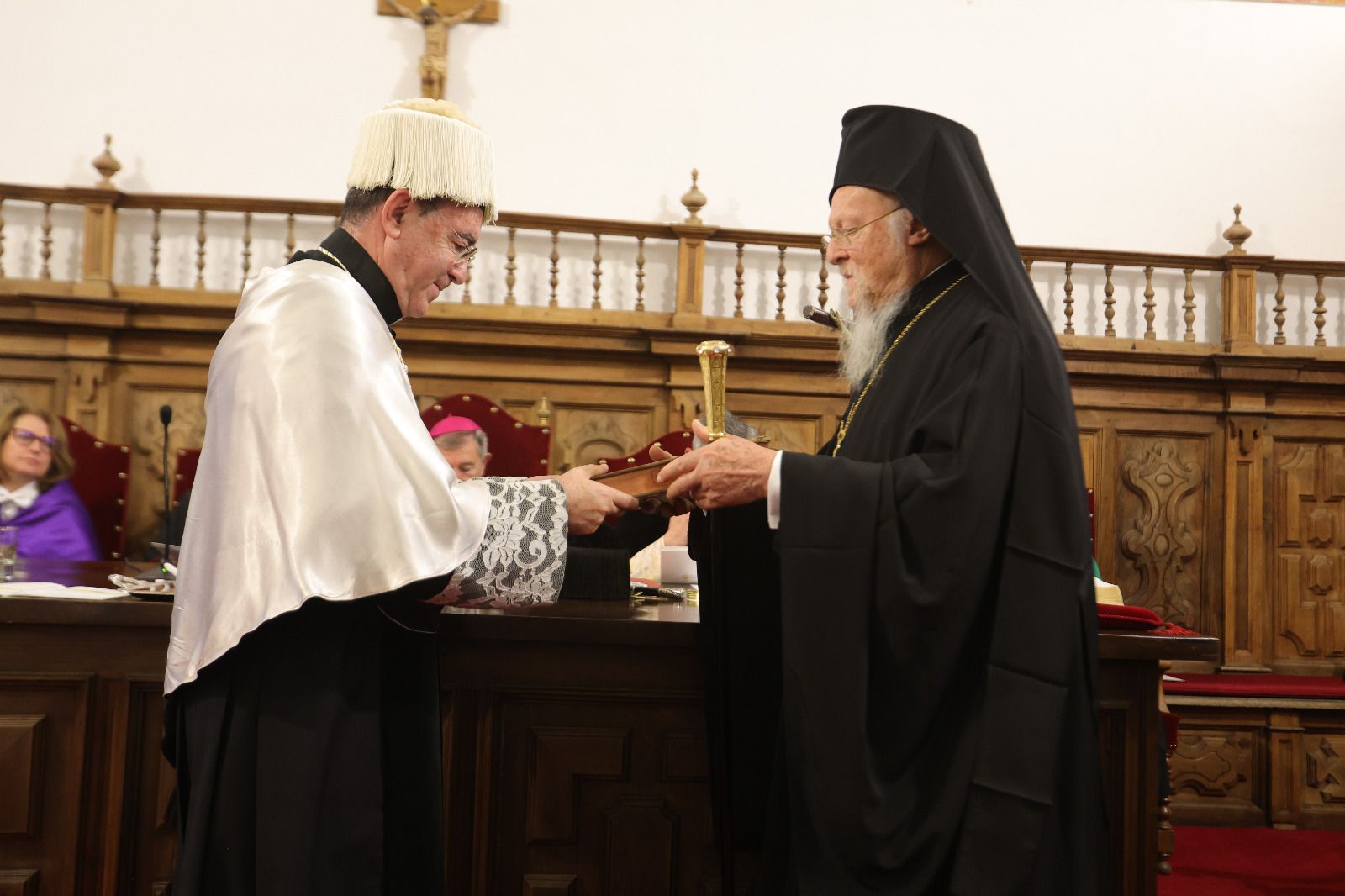
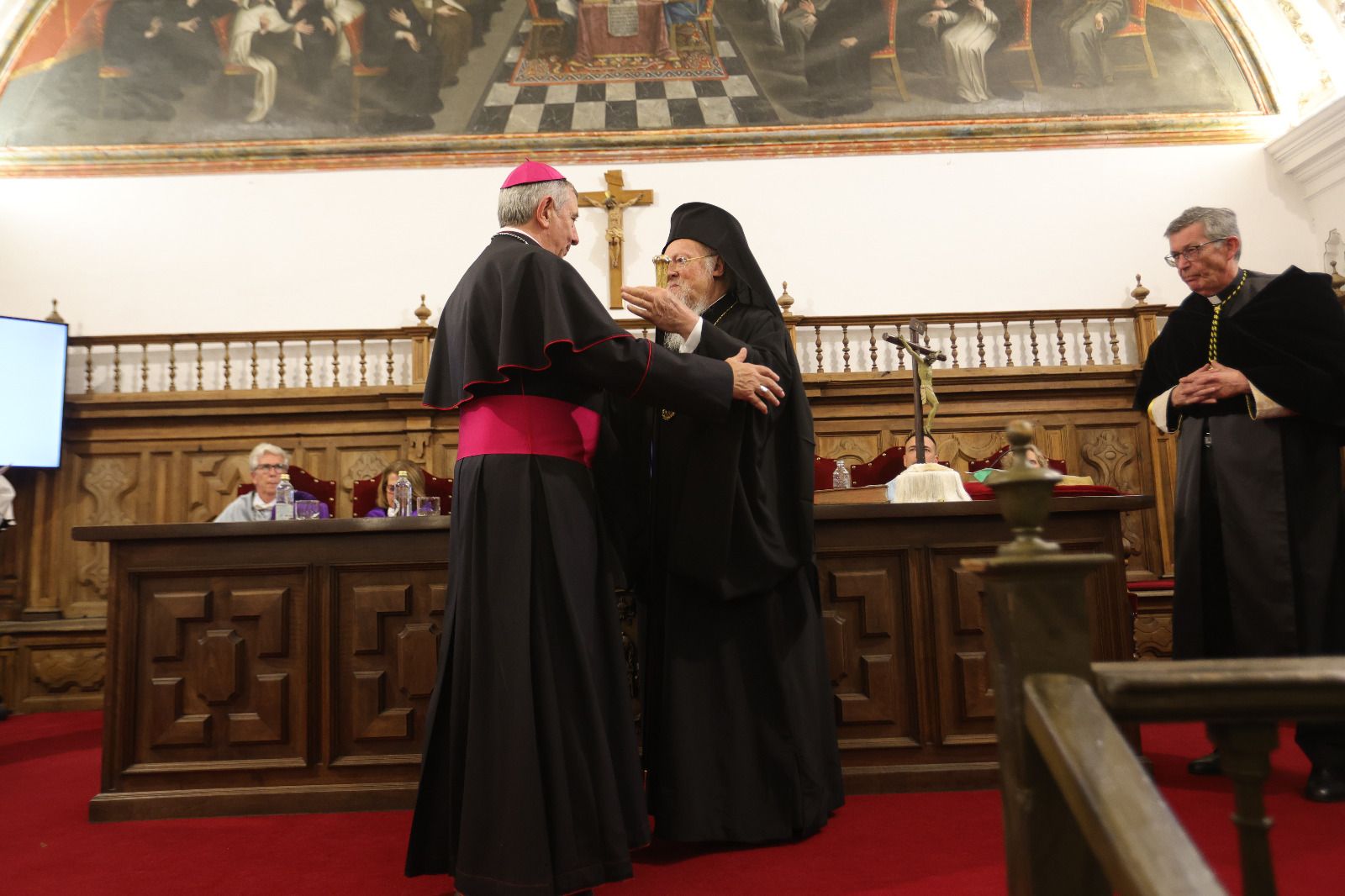
Discurso de Gracias de S.S. Bartolomé I
Su Santidad el patriarca ecuménico de la Iglesia ortodoxa y arzobispo de Constantinopla, Bartolomé I, ha destacado en su Discurso de Gracias que “si bien nos sentimos honrados por este conmovedor reconocimiento de nuestro modesto servicio para promover las relaciones y conversaciones entre Iglesias cristianas y Comunidades interreligiosas, nos gustaría llamar su atención sobre la visión esencial y misión excepcional de la Iglesia de Constantinopla, a la que hemos tenido la suerte de servir durante más de treinta años como pastor espiritual. (…) Nuestra Iglesia ha promovido proféticamente la causa de la unidad ecuménica entre confesiones cristianas distanciadas y otras comunidades religiosas, tanto a través del vibrante movimiento ecuménico desde principios hasta mediados del siglo XX, como también a través del vital diálogo interreligioso realizado durante la última parte del siglo XX”.
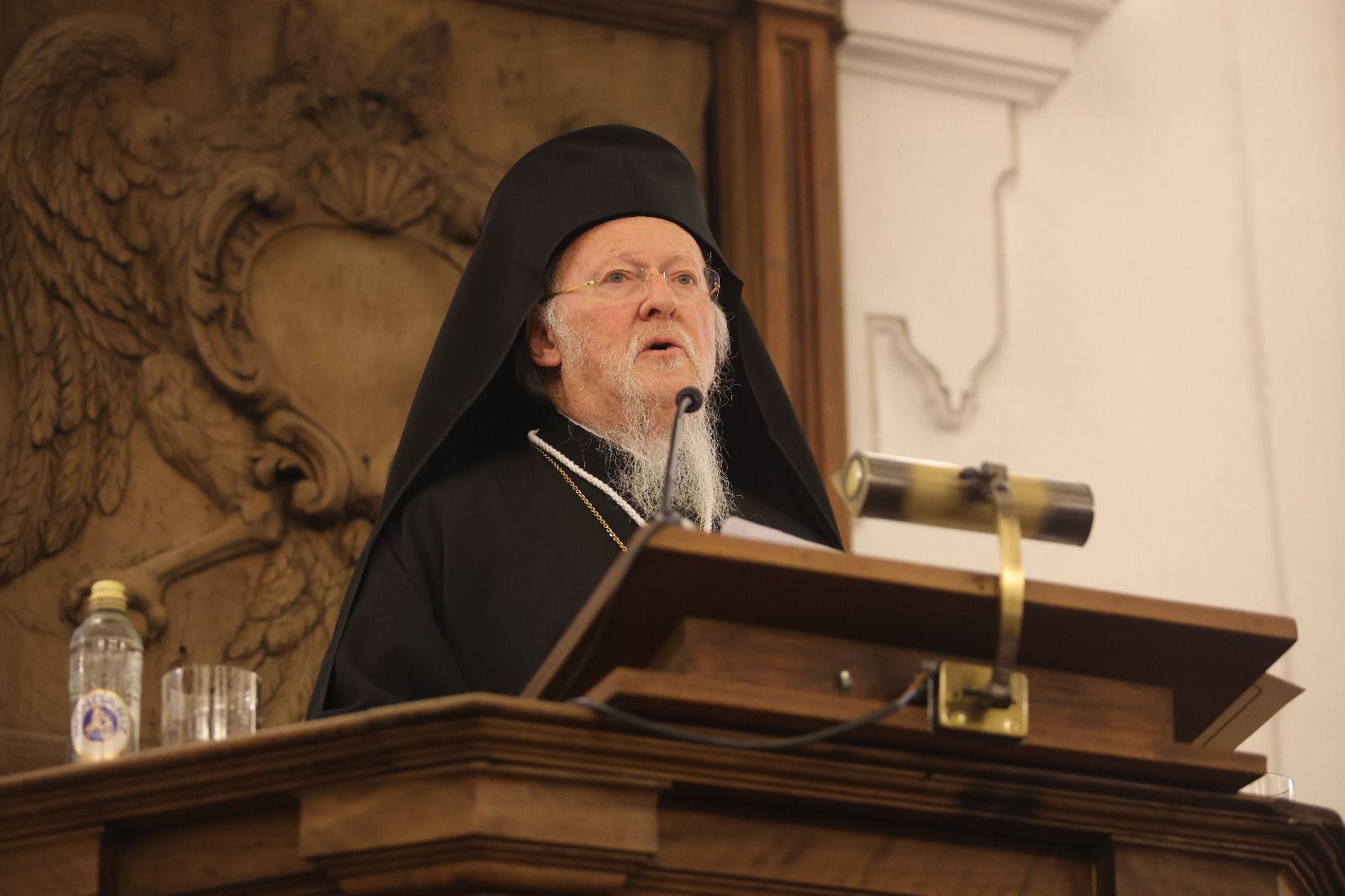
Sus palabras, en esta línea, han destacado la importancia del servicio ecuménico: “Saludamos el generoso honor de este doctorado honoris causa en nombre de la institución del Patriarcado Ecuménico. Porque el servicio ecuménico es nada menos que el ADN mismo del Patriarcado Ecuménico. A pesar de las críticas persistentes y equivocadas, la Iglesia de Constantinopla nunca ha percibido su ministerio o misión como una forma mundana o un modelo secular de expansionismo. Más bien, entiende su propósito y aspiración como la aceptación universal y el avance de la dignidad humana y la justicia social en cada persona, creada a imagen de Dios y en cada rincón del mundo de Dios”.
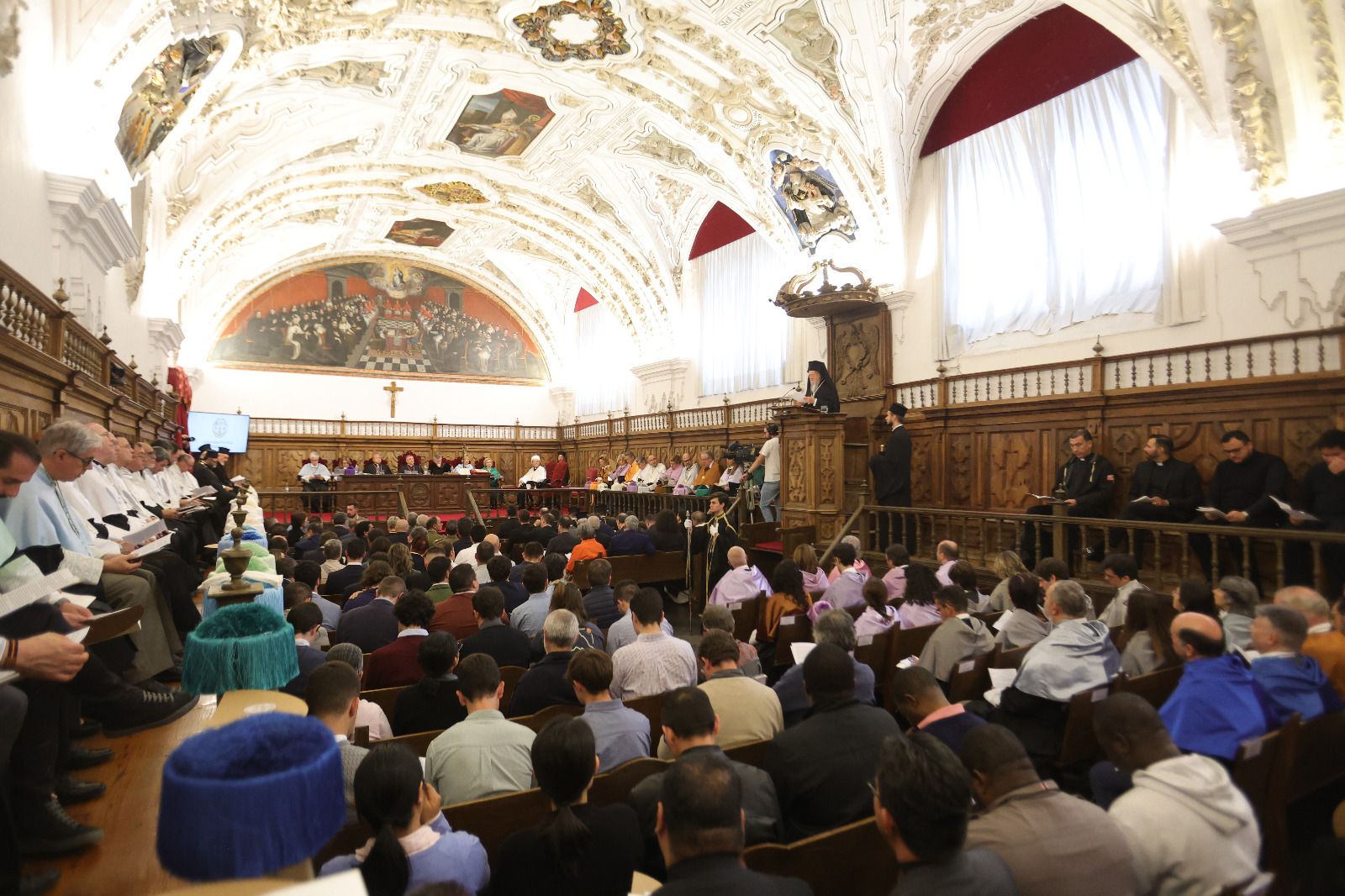
Por otra parte, su Santidad ha hecho referencia a la situación actual, especialmente en Ucrania y en Oriente Medio. “En un mundo destrozado por contrastes y conflictos, el intercambio de un diálogo pacífico y constructivo constituye la única manera de lograr la reconciliación y la unidad (…). Porque la verdad no teme al diálogo; al contrario, la verdad siempre invita y persigue el diálogo (…). Todos hemos visto las trágicas consecuencias de un mundo que rechaza el diálogo y refuerza la división. En los últimos meses hemos observado la destrucción de vidas humanas y la devastación del medio ambiente natural en la invasión injustificada de Rusia, y no provocada, al territorio soberano de Ucrania. Y ahora, ante nuestros propios ojos, vemos la devastadora pérdida de innumerables vidas inocentes, junto con la pérdida destructiva de estructuras e infraestructuras en Oriente Medio, donde ha estallado nuevamente un conflicto perpetuo, porque como seres humanos no estamos dispuestos a colaborar y ceder por el bien de nuestros hermanos y hermanas, así como por la protección de la creación sagrada de Dios. En el pasado, junto con nuestro querido hermano, el Papa Francisco, nos esforzamos por reunir y dialogar con los líderes de Israel y Palestina. Y hace solo unos días emitimos una firme declaración contra el uso de la violencia supuestamente para establecer la paz”.
Las palabras de su Santidad Bartolomé I han finalizado con un llamamiento a la paz y al diálogo “este espíritu de diálogo sincero y amoroso es el que la Iglesia de Constantinopla ha puesto en práctica en sus relaciones entre los cristianos divididos, proclamándolo al mismo tiempo a todos los creyentes y personas de buena voluntad, dondequiera que se encuentren. Sabemos por amarga experiencia que la religión puede fácilmente ser utilizada indebidamente como bandera de fanatismo y conflicto. Sin embargo, también estamos convencidos de que la “paz que sobrepasa todo entendimiento” (Filipenses 4, 7), así como el “amor que todo lo excusa, todo lo cree, todo lo espera y todo lo soporta” (1 Corintios 13, 7) finalmente prevalecerán, si nuestra fe en Dios nos llena también de fe unos en otros”.
Gratulatoria
El Rector, Santiago García-Jalón, ha señalado en la Gratulatoria que “este es un día memorable. La Universidad pretende distinguir a una personalidad señera, pero, al mismo tiempo, confiriendo un doctorado de este género, la Universidad queda honrada al incorporar a su cuerpo de doctores a quien por la excelencia de sus méritos destaca sobre el común. Y así, el honor mencionado en el título atañe tanto a quien se quiere honrar otorgándole la dignidad de doctor cuanto a la Universidad que lo concede y queda de este modo enriquecida”. En esta línea, ha concretado que “al aceptar nuestro homenaje, su Santidad Bartolomé I escribe una página inolvidable en la historia de nuestra Universidad”.
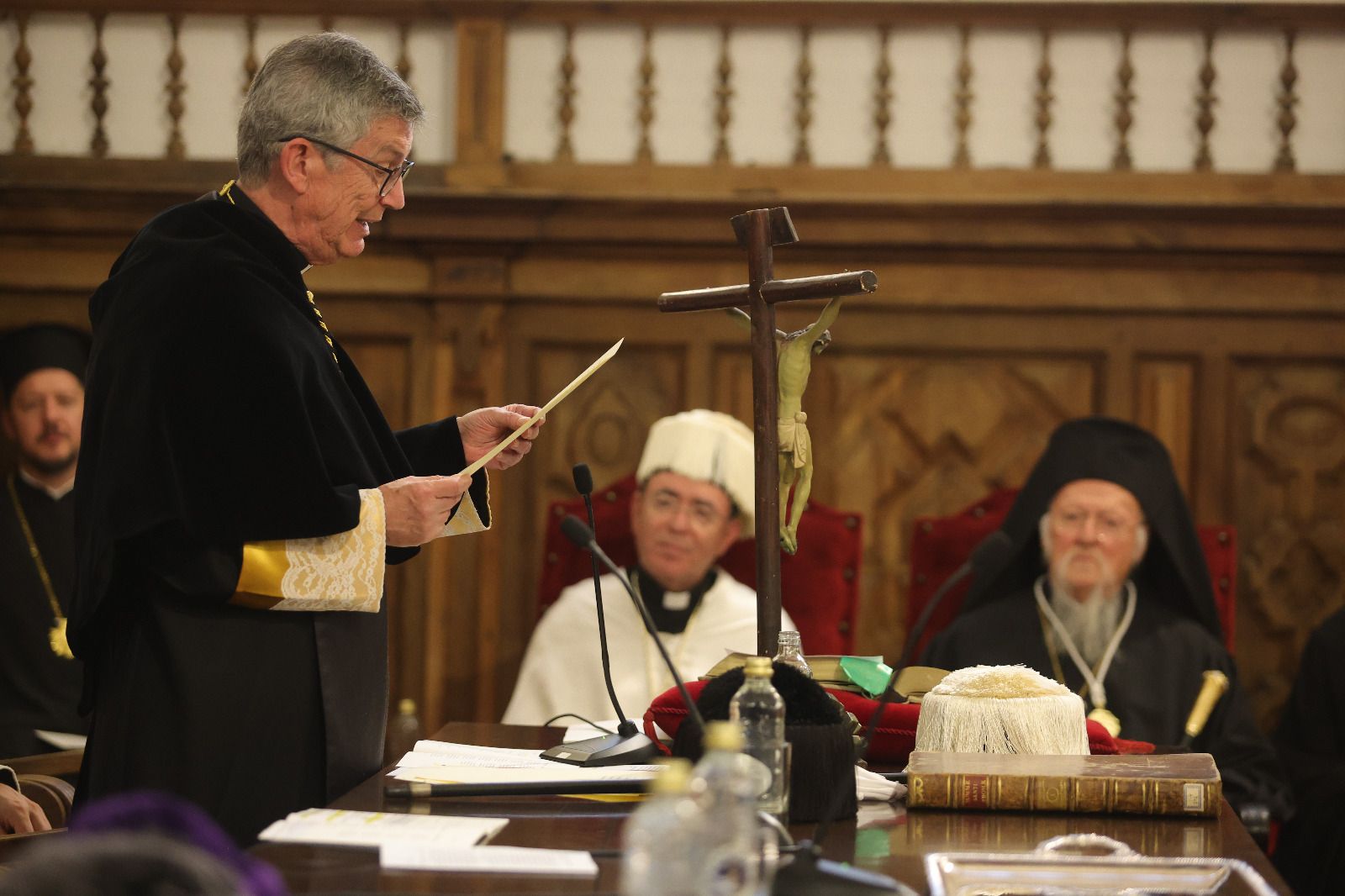
En su Gratulatoria, García-Jalón ha destacado que “la Universidad quiere también honrar y expresar su cordial afecto y su admiración hacia una venerable y dignísima Iglesia hermana nuestra, que atesora insondables riquezas de la perenne tradición del cristianismo y regenera la teología y la vida de la Iglesia romana con aguas siempre vivas”.
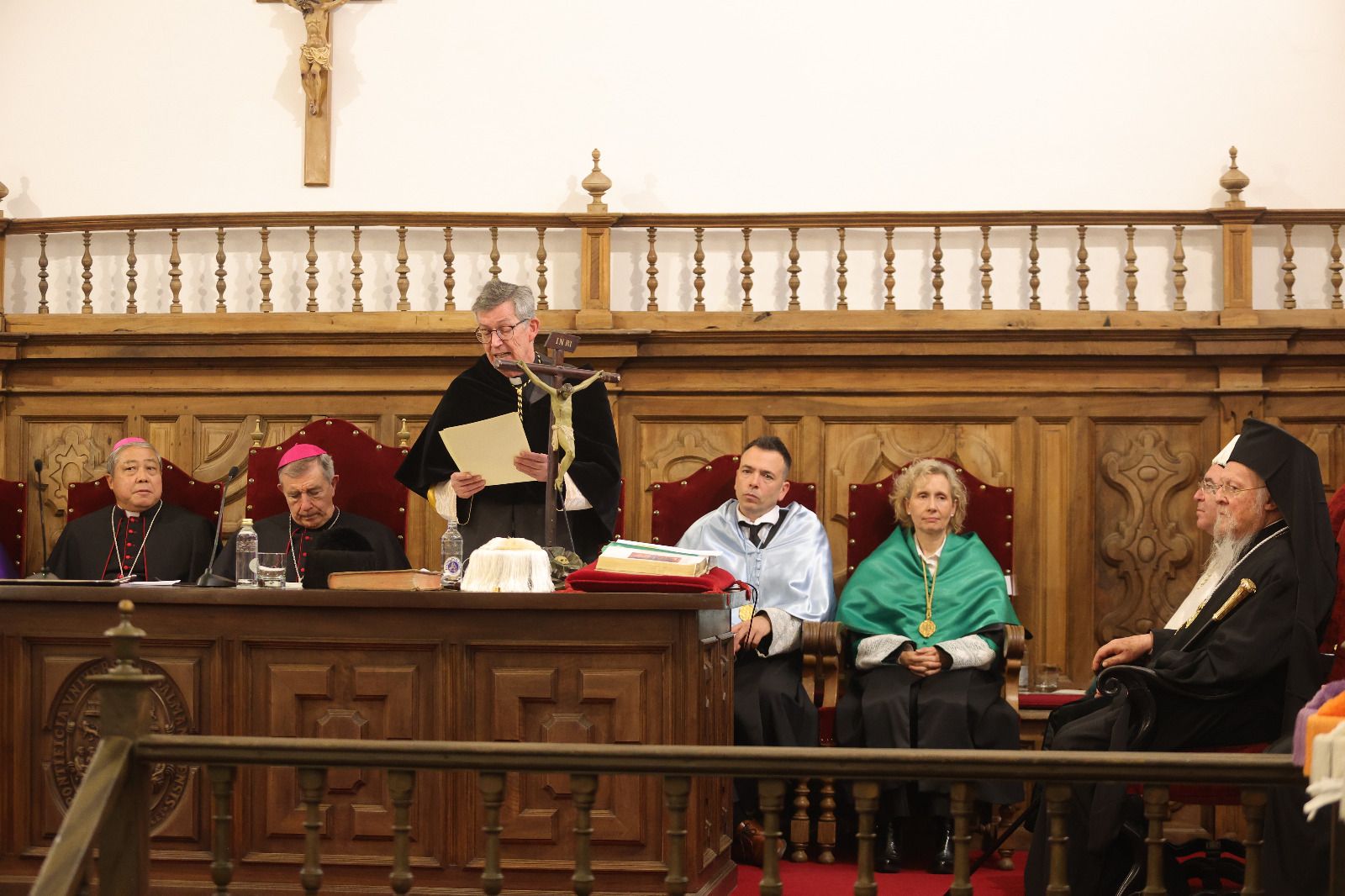
En sus palabras, el Rector de la Universidad ha deseado a su Santidad que “quiera Dios, y ese es también nuestro deseo, que vuestra visita a la Universidad Pontificia de Salamanca, Universidad de la Conferencia Episcopal Española, os sea ocasión de reposo y que, a cambio de la luz que habéis difundido en vuestro viaje, ex oriente lux, encontréis hoy entre nosotros unas horas de descanso que os sean como el amable sosiego del atardecer”.
El acto ha contado, además, con la asistencia del Nuncio Apostólico en España, Mons. Bernardito Cleopas Auza; el cardenal arzobispo de Estocolmo, Mons. Lars A. Arborelius; el obispo de León, Mons. Luis Ángel de las Heras; los metropolitas de Calcedonia, S.E. Emmanuel Geron; Lemnos, S.E. Ierotheos; Francia, S.E. Demetrios, y España y Portugal, S.E. Bessarion Komziás; la vicerrectora de la Universidad de Salamanca, Ana María Martín Suárez; los embajadores de Grecia en España, Ilias Fotopoulos, y de Grecia en Portugal, Ioannis Metaxas; la exembajadora de Austria en España, Ullrike Tilly; el exembajador de España en Suecia, Antonio Núñez García-Saúco; el subdelegado de Defensa en Salamanca, Emilio García Herrera, y el teniente coronel jefe de la Comandancia de la Guardia Civil en Salamanca, Pedro Merino Castro, entre otras autoridades académicas, empresariales, civiles y militares.
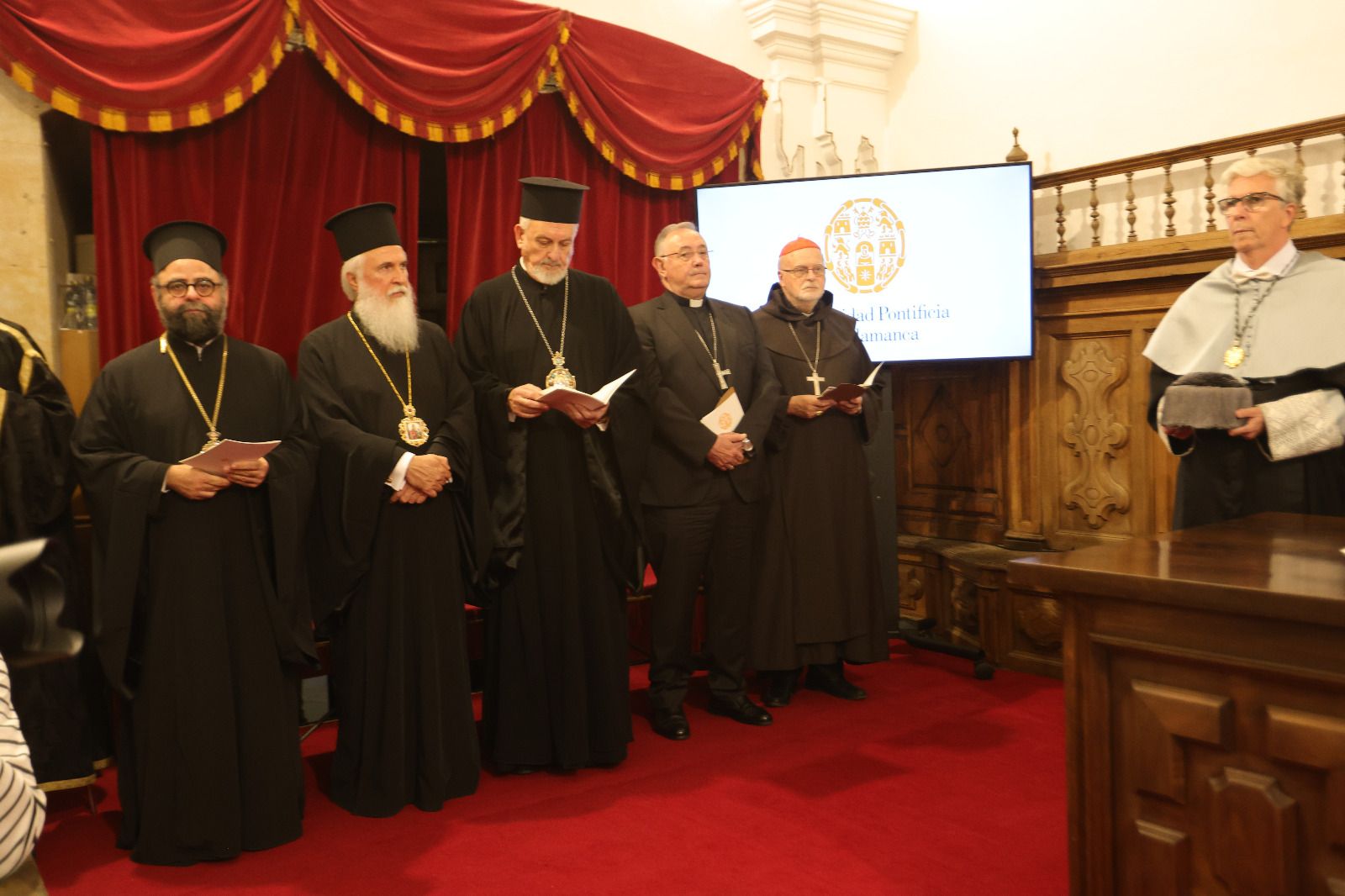
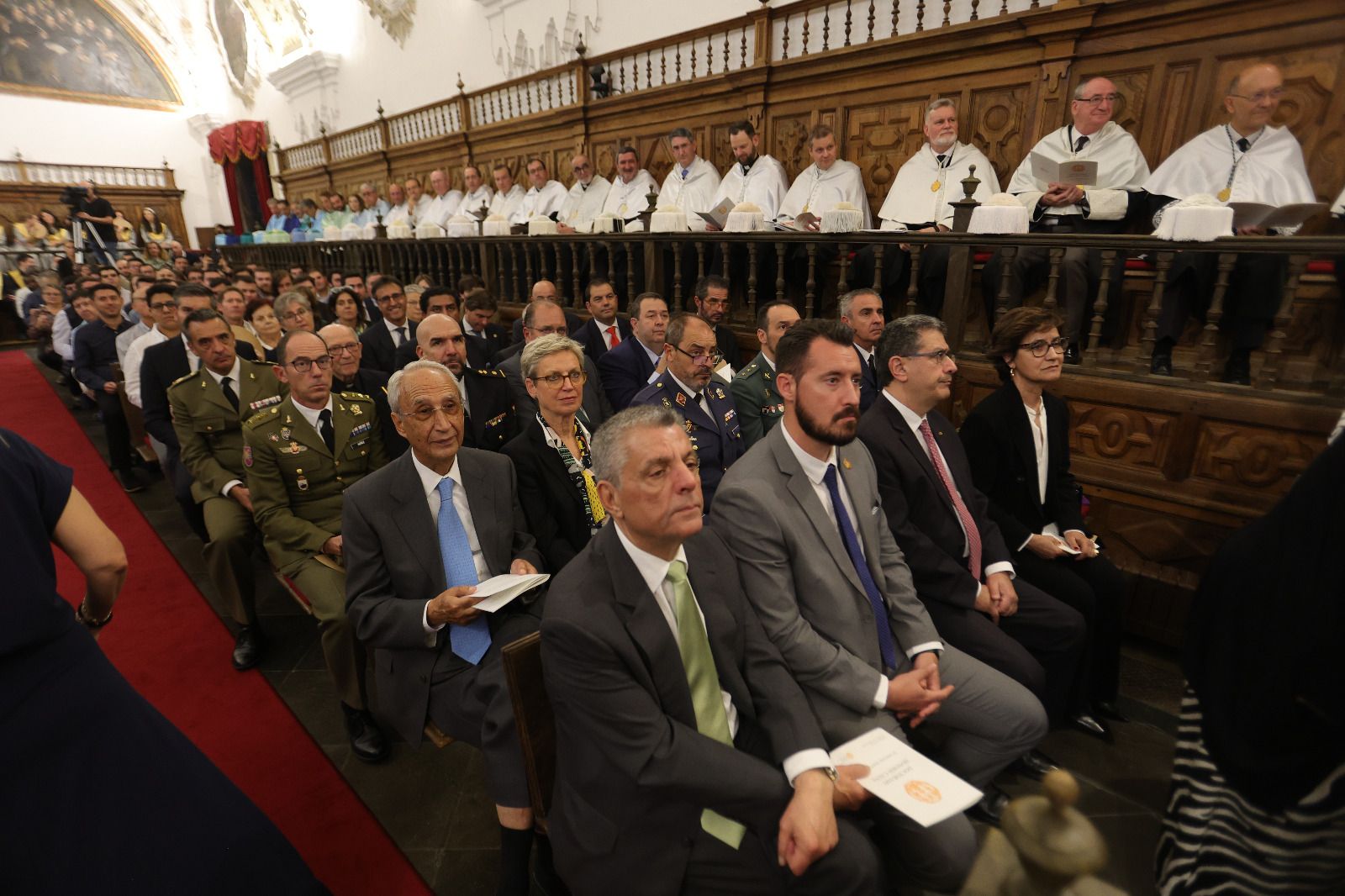
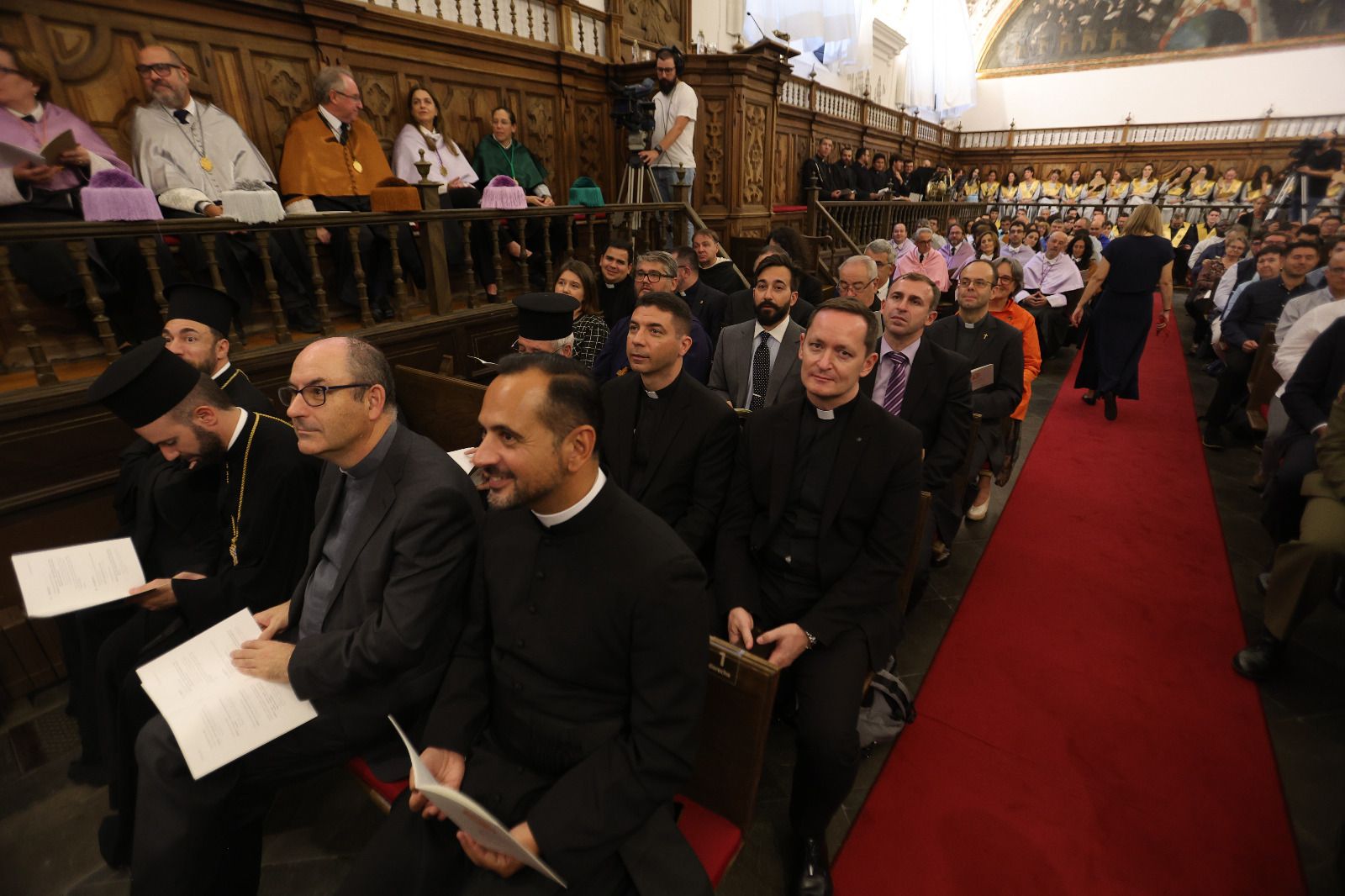
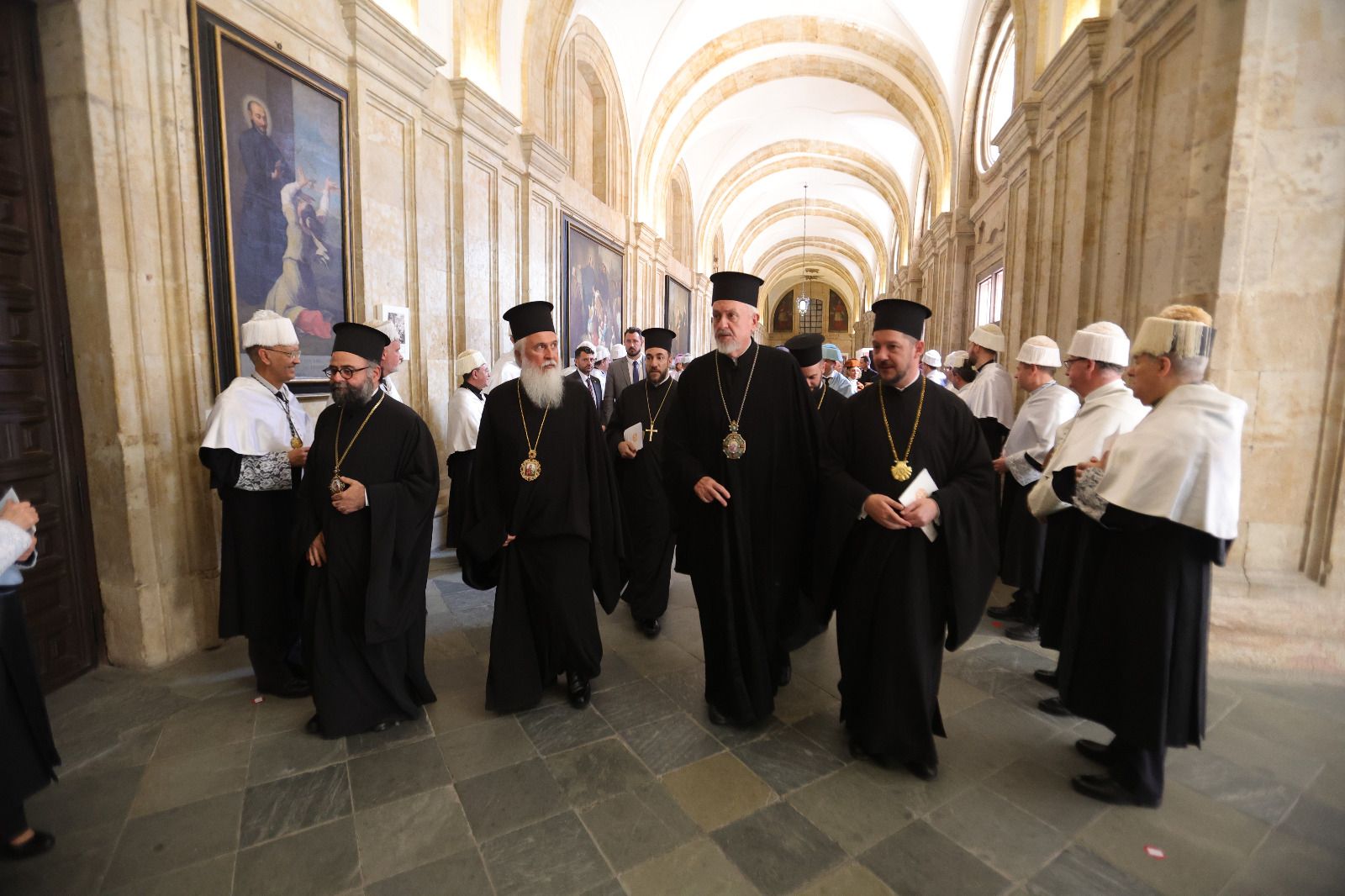
Biografía de su Santidad Bartolomé I (extracto de la Laudatio)
Su Santidad Bartolomé I, de nombre secular Demetrio Archondonis, nació en la aldea de San Teodoro (hoy Gökçeada), isla de Imbros (Turquía), el 29 de febrero de 1940. Desde el 2 de noviembre de 1991, fecha de su elevación al Santo Trono, es el 270º arzobispo de Constantinopla, Nueva Roma, y Patriarca Ecuménico (nombre histórico que data del siglo sexto), bajo cuyo título es considerado como primus inter pares (el primero entre iguales) en la Iglesia ortodoxa, y el líder espiritual de los ortodoxos todos del mundo en su tradición bizantina.
Recibió su educación elemental y secundaria en Imbros y Estambul. Brillantemente licenciado en Teología por la Escuela Teológica de Halki en 1961. Ese mismo año fue ordenado diácono por el metropolita Melitón de Calcedonia y recibió el nombre de Bartolomé.
Seguidamente, prosiguió estudios de graduado en el Pontificio Instituto Oriental de la Universidad Gregoriana de Roma. Continuó con sus estudios en el Instituto Ecuménico de Bosey (Suiza) y en la Universidad de Munich (Alemania). Su tesis doctoral, presentada en la Universidad de Atenas, versó sobre el Derecho Canónico, siendo enseguida miembro fundador de la Sociedad de Derecho Canónico de las Iglesias Orientales.
Ordenado sacerdote en 1969, el venerable patriarca Atenágoras I lo elevó poco después al rango de archimandrita. Entre 1968 y 1972 sirvió como decano asistente en la Escuela de Teología de Halki y en 1972 asumió la dirección de la oficina privada patriarcal fundada por su santidad Demetrio I, patriarca de Constantinopla. Consagrado obispo en 1973 y promovido a metropolita de Filadelfia, en enero del año 1990, fue nombrado metropolita de Calcedonia, y el 2 de noviembre de 1991 llegó al Trono Ecuménico, como sucesor del fallecido Demetrio I.
Su Santidad habla griego, latín, turco, inglés, francés y alemán. Es doctor honoris causa por una veintena de universidades de todo el mundo, a las que hoy se une la Universidad Pontificia de Salamanca.

